But when the New Carlisle woman connected with a Medicare adviser, her experience turned around. What started as scary switched to “seamless.”
“I think having someone who knows the system and can help you navigate it is absolutely essential,” Hoffman said.
Chris Curtis, chief executive officer and a co-founder of Medicare Planning of Dayton, agrees. Although the information that new enrollees need is available to them, it can be confusing, he said. Telemarketers, advertising and even well-intentioned friends also can lead Medicare beneficiaries astray.
“The problem is it has become so complicated,” said Curtis, a Medicare broker since 2006 who assisted Hoffman.
Beneficiaries can make changes to their current Medicare plan during the upcoming annual open enrollment period, from Oct. 15 to Dec. 7.
Medicare doesn’t have a one-size-fits-all plan, said Pam Smith, a Dayton-based Medicare specialist and certified senior adviser with the Medicare Resource Center.
While some people have told Smith that they want to stay on their current plan for the rest of their lives, that’s not always the best choice. Networks change – and so does a person’s health, she said. Annual notices of change that beneficiaries receive in the mail in September or the early fall will outline what has altered in a plan, she said.
Local representatives are the most familiar with what is available in a specific area. Needs including medications, doctors and other factors also can play a part in deciding which plan is best, said Smith, who has worked with beneficiaries for 14 years.
“It doesn’t cost anything to look around,” she said.
Hoffman, 66, liked her employer-provided insurance and stuck with it instead of switching to Medicare when she turned 65. She began her Medicare research last year in advance of her June retirement.
She wanted an adviser who represented multiple companies and could help find the best choice for her and her husband, Joe.
“I asked all the usual questions,” she said, like what was covered, co-pays, minimums and maximums.
Medicare brokers should represent a large number of companies – preferably all of them, Curtis said – and should never charge the client. They also should be accessible year-round, he said.
Friends may be able to recommend a broker, but they may not be the best resource to find a Medicare plan. Neighbors, relatives and friends can have different doctors, different budgets and different travel habits, and they will need a plan that meets their own individual requirements.
A plan might seem great at first glance, but it probably isn’t the best option if a preferred doctor isn’t in-network, he said.
“You can’t just look at a Medicare plan on paper and say it’s a good plan,” Curtis said. “It’s all about networks.”
Know your options, he said. Don’t defer to telemarketers, and don’t put off a decision.
“It’s your health care,” Curtis said. “You have to take it seriously.”
What is Medicare and who is eligible?
Medicare is a federal health insurance program for those who are 65 and older, as well as for younger people who have certain disabilities or diseases.
When can you generally first sign up for Medicare?
Beneficiaries have a seven-month window to sign up for Medicare, said Curtis This includes the three months before turning 65, the birth month itself and the three following months.
When is Medicare’s open-enrollment period?
Open enrollment is every year from Oct. 15 to Dec. 7. “That is when beneficiaries can make a change to their current plan,” said Smith.
When should you go on Medicare?
“It depends,” Curtis said. A person who is already collecting Social Security will automatically get a Medicare card. Others should either sign up for Medicare or remain with coverage from a workplace. For most people who are working after the age of 65, Medicare will be the better and cheaper option. This isn’t always the case, however, and an adviser can help you compare plans.
Once you choose a Medicare plan, can you stay on it forever?
Some people want to, but that isn’t always the best choice, Smith said. Health changes. Networks change. “You need to really pay attention to that,” she said.
Who can help you choose your Medicare plan?
Be wary of someone contacting you about Medicare options, Smith said. In addition, local advisers will be the most familiar with what is available in your area.
Advisers should never charge clients a fee, Curtis said.
The Ohio Department of Insurance also offers free Medicare assistance through the Ohio Senior Health Insurance Information Program. OSHIIP’s toll-free hotline can be reached at 800-686-1578.
About the Author
